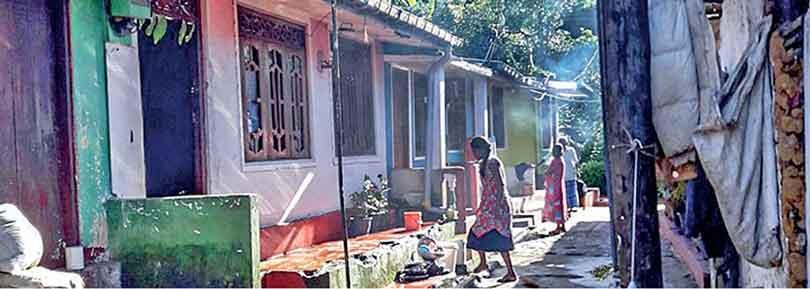Reply To:
Name - Reply Comment
Last Updated : 2024-05-15 00:01:00
Poor facilities in the plantations and cultural flaws result in very young girls being sent off to the cities to work as domestics

Line houses in Sri Lankan tea plantation
 The death of 16 year-old housemaid Ishalini in a former Sri Lankan Minister’s house in Colombo recently, has raised the issue of the non-implementation of Sri Lankan laws relating to child labour. That is as it should be. But there’s more to the girl’s case than a violation of a legal age bar. Her death ought to shine a light on the plight of the plantation workers’ community to which she belonged.
The death of 16 year-old housemaid Ishalini in a former Sri Lankan Minister’s house in Colombo recently, has raised the issue of the non-implementation of Sri Lankan laws relating to child labour. That is as it should be. But there’s more to the girl’s case than a violation of a legal age bar. Her death ought to shine a light on the plight of the plantation workers’ community to which she belonged.
While sections of the estate workers’ community have progressed visibly in the last two decades, the bulk of them are still among the poorest in Sri Lanka. Compared with people in the ‘urban’ and ‘rural’ sectors, those in the ‘estate’ sector are poorer and more disadvantaged as per all parametres. Poverty combined with social factors push girls as young as 14 or 15 to Colombo or other big towns to work as domestics, sometimes in households with sexual predators.

Conditions in the plantations are marked by indebtedness, alcoholism, unhygienic surroundings, lack of space and privacy; relatively poor educational facilities; and a marked lack of avenues for social and economic advancement.
However, it is not as if the plantation community has not made any progress. According to the World Bank, monetary poverty rates in the estate sector saw a steep decline from 28% in 2006 to around 10% in 2012/13. According to the www.historyofceylontea.com the School Census Report published by the Ministry of Education had said that there was a 5.09% increase in the enrollment of students in the estate sector between 2018 and 2019.
There was also a 6.03% increase in the number of schools within the same period. The capacity of plantation sector schools had also expanded dramatically. The Ministry of Education reported an increase of 715 teachers employed in the span of only one year. The Student-Teacher Ratio (STR) in schools in the estates recorded impressive improvements, standing at 15.1 in 2019, suggesting greater individual attention to students. It is noteworthy that the national Student-Teacher Ratio was 16.5 in the same year. This implies a narrowing of the gap in the quality of education available to estate sector communities relative to the rest of the island, the website said.
According to the World Bank between 2003 and 2012, in Sri Lanka as a whole, the proportion of students who completed primary level education improved by only 4%, but the corresponding improvement in the estate sector was 10%. This dramatic improvement was complemented by advancements in higher education as well. The proportion of students who completed O/Ls improved from 7 to 9% in the estate sector.
“Nowadays parents in the estates do not want their children to work in the estate. They want them to study,” said trade unionist and former MP, R.Yogarajan. “Many of the girls are in Colombo and Kandy working efficiently in supermarket cash counters,” he pointed out.
The RPCs have also supported deserving candidates who went on to pursue their tertiary education in various disciplines relating to medicine, law, engineering, and arts over the years. The RPCs have also partnered with organizations like the MJF charitable foundation to provide over 840 educational scholarships to deserving candidates accepted for a university education, and students who have performed well at their GCE Ordinary Level examination, the www.historyofceylontea.com said. Yogarajan supplemented this saying that today, there are over 1000 estate youth in Lankan universities.
Downside
However, the encouraging statistics cited above were only about schools in estates run by the large Regional Plantation Companies. The condition of workers in the small tea plantations in South Sri Lanka leaves much to be desired.
There are various other aspects of plantation life which cause grave concern. Malnutrition is rampant. The World Bank says that districts with a high percentage of tea estates have the highest rate of stunting among children under five. The 2017 Demographic and Health Survey found that the rate of stunted children and underweight adult women in estates was, respectively, 2.9 and 3.4 times higher than in cities. Similarly, low birth weight rates in the estates were 2.4 times higher. The stunting rate of 36% in Sri Lanka’s estate sector showed a ‘high’ public health significance while the wasting (16%) and underweight rates (36%) showed a ‘very high’ public health significance, requiring urgent action.
In their paper entitled: Drinking Water and Sanitation Conditions of Households in Tea Estates: A Case Study from the Giragama Estate, T. Sellathurai et al., say that the estate sector has bad health and sanitation conditions compared to the rural and urban sectors. In 2012, the coverage for water and sanitation services for urban, rural and estate sectors were 100%, 82% and 62% and 100%, 82% and 55%, respectively. The Millennium Development Goals and the National Development Plan target 80%, 90% and 100% of water for the estate, rural and urban areas, respectively.
The housing situation is appalling. Only 5.6% of the estate poor owned a house in 2012/13, and only 11.3% of the estate ‘near-poor’ did. In contrast, 90.4% of the ‘rural’ poor (non-estate) owned a house. New housing schemes, including an Indian government aided scheme, have been launched. But a lot remains to be done. A World Bank report of 2015 entitled: Sri Lanka: Ending poverty and promoting shared prosperity said that between 1980 and 2014, only 31,000 houses had been constructed on tea and rubber plantations.
School dropout rates are high. According to the 2015 World Bank report, only 53 to 63% of estate children had completed their primary school education, which was significantly lower than the national average, which stood at between 82 and 86%. Only 20% of the population of the tea estates had had secondary education and 2% had post-secondary education compared to the national average of 52% and 21% respectively.
Alcoholism
A major reason for the generally poor health in the estate population and also economic distress is addiction of alcohol, says Yogarajan. Surveys reveal that 75% of the men have alcohol addiction issues. Many women also drink. “Liquor is sold on credit in the estates. Every wage day the creditors collect the dues, leaving little for meeting other expenses,” Yogarajan said.
Alcoholism leads to indebtedness. 69% of households in the plantation district of Nuwara Eliya are in debt to an institution or another person. Borrowing from one to pay back another loan is common in the estates. Poverty, indebtedness and alcoholism combine to create a poor work ethic, bad behavior and dishonesty, empirical evidence indicates.
Alcoholism also leads to domestic violence. A survey revealed that 83% of tea estate women suffered from domestic violence, 20% of which was sexual. Estate women and girls live under an oppressive patriarchy with sexual predators also hovering around. According to Yogarajan, concerned estate families prefer to send their young girls away from the estate to ‘good families’ in towns like Colombo so that they are protected from male predators in the estates. But some unlucky ones land up in houses where the employers themselves turn out to be predators.
The root cause of illegal child labor is poverty and social backwardness. And exploitation of child workers by sexual predators attests to the deterioration of normative standards in the society at large, right across the socio-economic class structure. Add to this, the weakening of governmental and law and order institutions by political and money powers-that-be, tragic cases like that of Ishalini naturally occur.

Add comment
Comments will be edited (grammar, spelling and slang) and authorized at the discretion of Daily Mirror online. The website also has the right not to publish selected comments.
Reply To:
Name - Reply Comment
US authorities are currently reviewing the manifest of every cargo aboard MV
On March 26, a couple arriving from Thailand was arrested with 88 live animal
According to villagers from Naula-Moragolla out of 105 families 80 can afford
Is the situation in Sri Lanka so grim that locals harbour hope that they coul